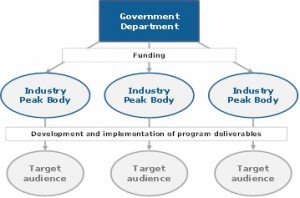
Strengthening stakeholder relationships through monitoring and evaluation
Monitoring and evaluation provides a valuable process for enhancing partnerships and stakeholder engagement.
The situation
A Commonwealth Department engaged Grosvenor to develop an evaluation framework, including data collection tools, for a nationwide initiative across a number of industry sectors. The framework aimed to achieve rigorous monitoring and evaluation activities over the life of the program.
The initiative was implemented and delivered by the Commonwealth in collaboration with industry peak bodies. An overview of the program’s delivery mechanism is depicted below:

The challenge
Significant differences were identified in the nature of each industry sector as well as the approaches of industry peak bodies’ in implementing the program. This posed a number of challenges to the Commonwealth Department’s ability to consistently and effectively monitor and evaluate the program’s achievements. Notably, this included ensuring industry peak bodies collected sound and valuable data from the target audience.
The project
We commenced the project by conducting a comprehensive program logic workshop to:
- create a shared understanding of how the program works, including confirming the desired outputs, outcomes/impacts and the program’s objective
- examine the program’s context, including identifying potential supporting and disrupting factors and influences, such as the strategic drivers of industry peak bodies
- outline the role and responsibilities of Commonwealth and the industry peak bodies
- explore some of the beliefs and assumptions underlying the program, including potential conflicting goals of the various stakeholder groups delivering the program
- identify suitable performance measures to appropriately monitor and assess the program throughout its duration.
Sufficient engagement of industry peak bodies in the development of the framework, rather than merely managing their performance, was key to achieving the desired project outcome. This enabled the development and successful implementation of an effective, apt framework, where:
- monitoring and evaluation results are being utilised to inform evidence-based decision-making
- accountability and transparency is driven amongst stakeholders
- lessons learned for future projects are identified.
We interviewed industry peak bodies, who welcomed the opportunity to provide input, and established mechanisms for their continuous engagement, including throughout the finalisation of the framework. In particular, we sought to gain an understanding of any existing or planned data collection activities to ensure a collaborative approach was undertaken and avoid any duplication in monitoring effort.
The results
The Department obtained a practical but flexible evaluation framework that balanced:
- the Department’s ability to effectively and efficiently monitor and evaluate the program; and
- the specific needs and evaluation activities undertaken by individual industry peak bodies.
Given the participatory manner of the framework’s development, buy-in to the monitoring and evaluation activities was secured, and the public-private partnership enhanced. The framework also provided a valuable process for institutionalising stakeholder engagement in the future.
The success of the project was highlighted by the client’s announcement that the framework’s approach would be adapted by other program areas.







 We are all about sharing our expertise to help you and your organisation be the best it can be.
We are all about sharing our expertise to help you and your organisation be the best it can be.